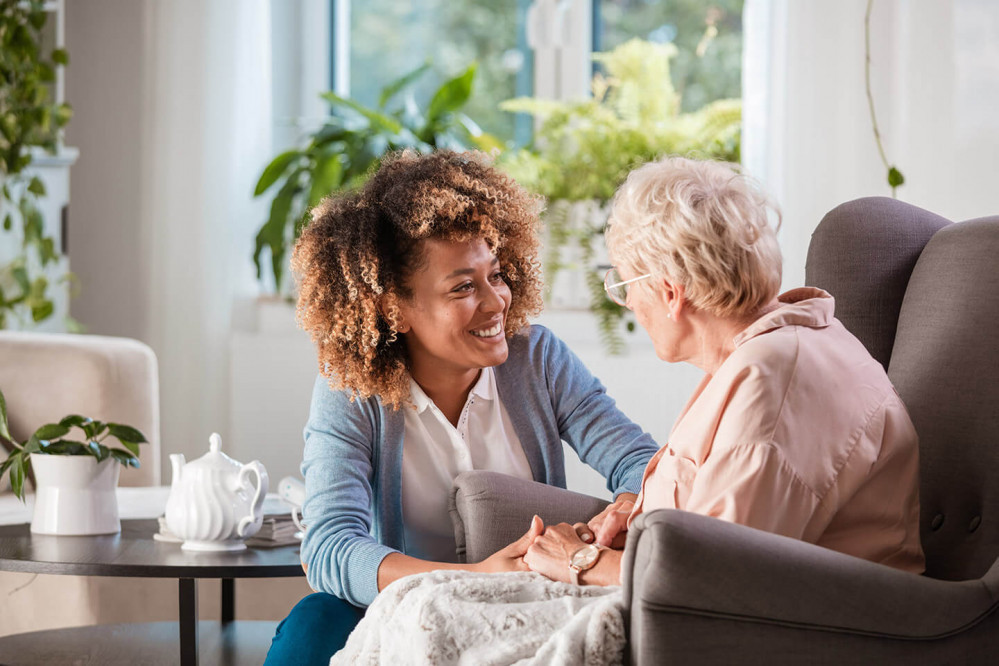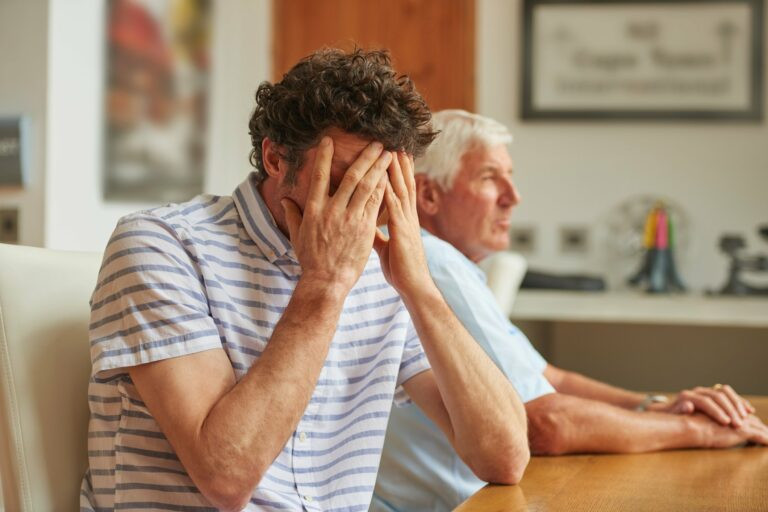Blog

25 Sep
Supporting Aging Parents: How to Plan Care Without Feeling Overwhelmed
Caring for an aging parent is a responsibility many adult children face at some point. With life expectancy rising and families often living in different cities, planning and coordinating care can feel overwhelming. At Alleva Home Care, we understand the challenges and want to share practical tips that can help you ensure your loved one stays safe, comfortable, and engaged while also taking care of yourself.
Start With a Care Assessment
One of the first steps in supporting an aging parent is understanding their needs. A care assessment helps identify areas where they may need assistance, including:
Daily living activities such as bathing, dressing, and meal preparation
Medication management and health monitoring
Transportation for appointments and errands
Social engagement and mental stimulation
Having a clear picture of their needs allows you to plan the right level of support through home care services, family assistance, or a combination of both.
Consider Home Care Early
Many families wait until a crisis occurs before seeking help, but early intervention can make a world of difference. Professional home care provides:
Flexible scheduling that fits your loved one’s routine
Trained caregivers who promote safety and independence
Support for both the caregiver and the family, reducing stress
By integrating home care early, your parent maintains independence and you gain peace of mind knowing help is available before an emergency arises.
Plan Finances and Legal Matters
Caring for an aging parent is not just physical it also involves financial and legal planning. Consider these steps:
Review insurance policies and long-term care options including Medicaid or VA support
Update legal documents such as power of attorney and advance directives
Discuss long-term financial planning with your parent to prevent stress in the future
Clear planning now prevents confusion and ensures your loved one’s wishes are respected.
Keep Communication Open
One of the biggest challenges families face is communication. Tips to improve dialogue include:
Schedule regular family meetings to discuss your parent’s needs and progress
Encourage your parent to share their preferences including what routines or services matter most
Document important information such as medications, appointments, and caregiver schedules
Transparent communication reduces stress, prevents misunderstandings, and ensures everyone is on the same page.
Take Care of Yourself
Caring for a parent can be emotionally and physically exhausting. Remember to:
Take breaks and ask for help when needed
Join support groups for adult children of aging parents
Recognize your limits and focus on quality care rather than trying to do everything yourself
Self-care is not selfish it ensures you can continue to support your loved one effectively.
The Alleva Home Care Difference
At Alleva Home Care we specialize in personalized home care that fits your family’s needs. From companionship and daily assistance to specialized memory care our trained caregivers are here to help. Early planning and the right support can improve quality of life for both your parent and your family
Start With a Care Assessment
One of the first steps in supporting an aging parent is understanding their needs. A care assessment helps identify areas where they may need assistance, including:
Daily living activities such as bathing, dressing, and meal preparation
Medication management and health monitoring
Transportation for appointments and errands
Social engagement and mental stimulation
Having a clear picture of their needs allows you to plan the right level of support through home care services, family assistance, or a combination of both.
Consider Home Care Early
Many families wait until a crisis occurs before seeking help, but early intervention can make a world of difference. Professional home care provides:
Flexible scheduling that fits your loved one’s routine
Trained caregivers who promote safety and independence
Support for both the caregiver and the family, reducing stress
By integrating home care early, your parent maintains independence and you gain peace of mind knowing help is available before an emergency arises.
Plan Finances and Legal Matters
Caring for an aging parent is not just physical it also involves financial and legal planning. Consider these steps:
Review insurance policies and long-term care options including Medicaid or VA support
Update legal documents such as power of attorney and advance directives
Discuss long-term financial planning with your parent to prevent stress in the future
Clear planning now prevents confusion and ensures your loved one’s wishes are respected.
Keep Communication Open
One of the biggest challenges families face is communication. Tips to improve dialogue include:
Schedule regular family meetings to discuss your parent’s needs and progress
Encourage your parent to share their preferences including what routines or services matter most
Document important information such as medications, appointments, and caregiver schedules
Transparent communication reduces stress, prevents misunderstandings, and ensures everyone is on the same page.
Take Care of Yourself
Caring for a parent can be emotionally and physically exhausting. Remember to:
Take breaks and ask for help when needed
Join support groups for adult children of aging parents
Recognize your limits and focus on quality care rather than trying to do everything yourself
Self-care is not selfish it ensures you can continue to support your loved one effectively.
The Alleva Home Care Difference
At Alleva Home Care we specialize in personalized home care that fits your family’s needs. From companionship and daily assistance to specialized memory care our trained caregivers are here to help. Early planning and the right support can improve quality of life for both your parent and your family

10 Aug
The Hidden Superpower of Home Care
For many families in the Greater Seattle area, the question isn't if a loved one will need support as they age, it's when. But here's something most people don't realize: home care isn't just about assistance with daily tasks -- it's about preserving independence, dignity, and joy in life's lter years.
In fact, research shows that aging at home improves one's emotional well-being, reduces hospital visits, and in some cases, extends life expectancy. Yet many famlies wait until a crisis occurs to explore care options. By then, they're stressed, rushed, and overwhelmed.
So, let's talk about why personalized home care is more than just help; it's a life-changing advantage for seniors and their families.
1. Familiar Surroundings Reduce Stress
Moving into an unfamiliar environment, no matter how comfortable, can be disorienting for seniors. The home they've lived in for decades isn't just a building, it's filled with memories, routines, and a sense of control.
Home Care allows seniors to:
Stay in a space where they feel safe and at ease.
Keep familiar pets, furniture, and daily rituals.
Avoid disruption of packing, selling a home, and moving.
The emotional stability can be especially critical for individuals with dementia or Alzheimer's, where routine and familiarity are essential.
2. One-on-One Care Beats Institutional Schedules
In large facilities,, caregivers often split their time among residents. In-home care offers dedicated, one-on-one attention, which means faster response times, personalized routines, and genuine relationship-building.
At Alleva Home Care, our clients get matched with caregivers whose skills and personality are the right fit -- whether that means helping with bathing and dressing, preparing favorite meals, or sharing a morning coffee while sharing stories.
3. Flexible Support That Grows With Your Needs
Needs change. What starts as a few hours of help with errands can grow into 24/7 assistance after a surgery or a health event. The beauty of home care is its built-in flexibility.
Families can increase or decrease hours, add specialized care, or even adjust schedules seasonally. This adaptability ensures clients only pay for the care they need, when they need it.
4. Better Family Peace of Mind
If you live out of state, or simply can't be there every day, knowing that a trained professional is supporting your loved one is priceless. Home care means you don't have to choose between your job, your kids, and your aging parent. You can be the son, daughter, or spouse again, rather than the stressed-our caregiver on a verge of an emotional breakdown.
How to Get Started with Home Care in Greater Seattle
The process doesn't have to be complicated. At Alleva Home Care, we start with a free in-home care assessment where we get to know your loved one's personality, needs, and goals. From there, we create a customized care plan and match them with the right caregiver.
Service areas include: Seattle, Bellevue, Kirland, Redmond, Mercer Island, Issaquah, Shoreline, Edmonds, Bothell, Everett, Tacoma, and surrounding communities.
In fact, research shows that aging at home improves one's emotional well-being, reduces hospital visits, and in some cases, extends life expectancy. Yet many famlies wait until a crisis occurs to explore care options. By then, they're stressed, rushed, and overwhelmed.
So, let's talk about why personalized home care is more than just help; it's a life-changing advantage for seniors and their families.
1. Familiar Surroundings Reduce Stress
Moving into an unfamiliar environment, no matter how comfortable, can be disorienting for seniors. The home they've lived in for decades isn't just a building, it's filled with memories, routines, and a sense of control.
Home Care allows seniors to:
Stay in a space where they feel safe and at ease.
Keep familiar pets, furniture, and daily rituals.
Avoid disruption of packing, selling a home, and moving.
The emotional stability can be especially critical for individuals with dementia or Alzheimer's, where routine and familiarity are essential.
2. One-on-One Care Beats Institutional Schedules
In large facilities,, caregivers often split their time among residents. In-home care offers dedicated, one-on-one attention, which means faster response times, personalized routines, and genuine relationship-building.
At Alleva Home Care, our clients get matched with caregivers whose skills and personality are the right fit -- whether that means helping with bathing and dressing, preparing favorite meals, or sharing a morning coffee while sharing stories.
3. Flexible Support That Grows With Your Needs
Needs change. What starts as a few hours of help with errands can grow into 24/7 assistance after a surgery or a health event. The beauty of home care is its built-in flexibility.
Families can increase or decrease hours, add specialized care, or even adjust schedules seasonally. This adaptability ensures clients only pay for the care they need, when they need it.
4. Better Family Peace of Mind
If you live out of state, or simply can't be there every day, knowing that a trained professional is supporting your loved one is priceless. Home care means you don't have to choose between your job, your kids, and your aging parent. You can be the son, daughter, or spouse again, rather than the stressed-our caregiver on a verge of an emotional breakdown.
How to Get Started with Home Care in Greater Seattle
The process doesn't have to be complicated. At Alleva Home Care, we start with a free in-home care assessment where we get to know your loved one's personality, needs, and goals. From there, we create a customized care plan and match them with the right caregiver.
Service areas include: Seattle, Bellevue, Kirland, Redmond, Mercer Island, Issaquah, Shoreline, Edmonds, Bothell, Everett, Tacoma, and surrounding communities.

15 Nov
The Role of a Caregiver: What to Expect from Home Care Professionals
When considering home care services, understanding the role of a caregiver is crucial. Caregivers provide essential support to individuals who need help due to aging, illness, or disability. Here’s a breakdown of what caregivers do, how they assist clients, and the impact they have on well-being.
What Does a Caregiver Do?
Caregivers help clients with a range of tasks, including:
Assistance with Daily Living
Caregivers assist with bathing, dressing, mobility, and toileting to ensure the client’s personal care needs are met safely.
Companionship
They provide emotional support, combat loneliness, and encourage social engagement, improving mental and emotional health.
Medication Reminders
While caregivers don’t administer medications, they ensure clients take their prescribed medication on time and help track doses.
Light Housekeeping
Caregivers may help with basic chores, meal preparation, and running errands to maintain a clean and functional home environment.
Health Monitoring
Caregivers observe changes in health, track progress, and communicate concerns to family members or healthcare providers.
How Caregivers Contribute to Well-Being
Caregivers not only assist with daily tasks but significantly impact overall health:
Physical Health: By supporting mobility, medication management, and exercise, caregivers help prevent falls and ensure proper care for chronic conditions.
Mental Health: Regular companionship and social interaction reduce feelings of isolation and boost mood.
Peace of Mind: Families gain peace of mind knowing their loved one is receiving consistent, professional care in the home.
Conclusion
Caregivers are integral to home care, offering both physical and emotional support. Whether it's helping with daily tasks, providing companionship, or promoting health, caregivers improve the quality of life for those they care for. If you're looking for professional home care services in Seattle, contact us today at 206-456-CARE for compassionate, personalized care for your loved one.
Keywords: caregiver, home care, personal care, daily living assistance, elderly care, companionship, medication reminders, home care Seattle, in-home care.
What Does a Caregiver Do?
Caregivers help clients with a range of tasks, including:
Assistance with Daily Living
Caregivers assist with bathing, dressing, mobility, and toileting to ensure the client’s personal care needs are met safely.
Companionship
They provide emotional support, combat loneliness, and encourage social engagement, improving mental and emotional health.
Medication Reminders
While caregivers don’t administer medications, they ensure clients take their prescribed medication on time and help track doses.
Light Housekeeping
Caregivers may help with basic chores, meal preparation, and running errands to maintain a clean and functional home environment.
Health Monitoring
Caregivers observe changes in health, track progress, and communicate concerns to family members or healthcare providers.
How Caregivers Contribute to Well-Being
Caregivers not only assist with daily tasks but significantly impact overall health:
Physical Health: By supporting mobility, medication management, and exercise, caregivers help prevent falls and ensure proper care for chronic conditions.
Mental Health: Regular companionship and social interaction reduce feelings of isolation and boost mood.
Peace of Mind: Families gain peace of mind knowing their loved one is receiving consistent, professional care in the home.
Conclusion
Caregivers are integral to home care, offering both physical and emotional support. Whether it's helping with daily tasks, providing companionship, or promoting health, caregivers improve the quality of life for those they care for. If you're looking for professional home care services in Seattle, contact us today at 206-456-CARE for compassionate, personalized care for your loved one.
Keywords: caregiver, home care, personal care, daily living assistance, elderly care, companionship, medication reminders, home care Seattle, in-home care.

19 Sep
The Ultimate Guide to Choosing Home Care Services in Seattle
Choosing the right home care services in Seattle for yourself or a loved one can be a daunting task. With a plethora of options available, it's essential to understand what to look for to ensure you get the best care possible. At Alleva Home Care, we are committed to providing exceptional home care services tailored to meet the unique needs of our clients. In this blog, we will guide you through the key factors to consider when selecting home care services in Seattle, helping you make an informed decision.
1. Assess Your Needs
Before diving into the search for home care services in Seattle, it's crucial to assess your specific needs or those of your loved one. Consider the following questions:
What level of care is required (e.g., companionship, personal care, medical care)?
Are there specific medical conditions that require specialized care?
How many hours of care per day or week are needed?
Are there any mobility or accessibility concerns?
Having a clear understanding of your needs will help you narrow down your options and find a home care provider that can meet those requirements.
2. Research Home Care Providers in Seattle
With your needs in mind, start researching home care providers in Seattle. Look for providers that offer the specific services you need, such as personal care, companionship, or specialized medical care. Check their websites for detailed information about their services, staff qualifications, and client testimonials.
3. Verify Credentials and Licenses
Ensure that the home care provider you choose is licensed and accredited by the appropriate regulatory bodies. In Washington State, home care agencies must be licensed by the Department of Health. Verify that the agency's caregivers are properly trained, certified, and have undergone background checks.
4. Consider Experience and Reputation
Experience matters when it comes to providing quality home care services. Look for providers with a solid track record and positive reviews from clients. At Alleva Home Care, we pride ourselves on our extensive experience and commitment to excellence in home care services in Seattle.
5. Evaluate Care Plans and Flexibility
A good home care provider should offer personalized care plans tailored to meet the unique needs of each client. Assess how flexible the provider is in adjusting care plans as needs change over time. This ensures that your loved one continues to receive the appropriate level of care.
6. Review Costs and Payment Options
Understand the costs associated with home care services and what payment options are available. Some services may be covered by insurance, Medicaid, or long-term care insurance. Make sure you discuss all costs upfront to avoid any surprises later.
7. Schedule a Consultation
Before making a final decision, schedule a consultation with potential home care providers. This gives you the opportunity to meet the caregivers, ask questions, and evaluate their approach to care. A face-to-face meeting can provide valuable insights into the provider's commitment to quality care and client satisfaction.
8. Seek Recommendations
Word of mouth can be a powerful tool when choosing home care services. Ask friends, family, and healthcare professionals for recommendations. Their firsthand experiences can provide valuable guidance in your decision-making process.
Conclusion
Choosing the right home care services in Seattle is a critical decision that can significantly impact the well-being of your loved one. By following these steps and considering the key factors outlined above, you can make an informed choice that ensures your loved one receives the highest quality of care. At Alleva Home Care, we are dedicated to providing compassionate, professional home care services that enhance the quality of life for our clients.
If you are looking for reliable and trusted home care services in Seattle, contact Alleva Home Care today to learn more about our comprehensive care options. We are here to support you and your loved ones every step of the way.
Keywords: home care services in Seattle, Seattle home care, home care providers Seattle, personal care services Seattle, home health care Seattle, senior care Seattle, Alleva Home Care
Meta Description: Looking for reliable home care services in Seattle? Read our comprehensive guide to choosing the best home care provider for your loved one's needs. Contact Alleva Home Care today!
1. Assess Your Needs
Before diving into the search for home care services in Seattle, it's crucial to assess your specific needs or those of your loved one. Consider the following questions:
What level of care is required (e.g., companionship, personal care, medical care)?
Are there specific medical conditions that require specialized care?
How many hours of care per day or week are needed?
Are there any mobility or accessibility concerns?
Having a clear understanding of your needs will help you narrow down your options and find a home care provider that can meet those requirements.
2. Research Home Care Providers in Seattle
With your needs in mind, start researching home care providers in Seattle. Look for providers that offer the specific services you need, such as personal care, companionship, or specialized medical care. Check their websites for detailed information about their services, staff qualifications, and client testimonials.
3. Verify Credentials and Licenses
Ensure that the home care provider you choose is licensed and accredited by the appropriate regulatory bodies. In Washington State, home care agencies must be licensed by the Department of Health. Verify that the agency's caregivers are properly trained, certified, and have undergone background checks.
4. Consider Experience and Reputation
Experience matters when it comes to providing quality home care services. Look for providers with a solid track record and positive reviews from clients. At Alleva Home Care, we pride ourselves on our extensive experience and commitment to excellence in home care services in Seattle.
5. Evaluate Care Plans and Flexibility
A good home care provider should offer personalized care plans tailored to meet the unique needs of each client. Assess how flexible the provider is in adjusting care plans as needs change over time. This ensures that your loved one continues to receive the appropriate level of care.
6. Review Costs and Payment Options
Understand the costs associated with home care services and what payment options are available. Some services may be covered by insurance, Medicaid, or long-term care insurance. Make sure you discuss all costs upfront to avoid any surprises later.
7. Schedule a Consultation
Before making a final decision, schedule a consultation with potential home care providers. This gives you the opportunity to meet the caregivers, ask questions, and evaluate their approach to care. A face-to-face meeting can provide valuable insights into the provider's commitment to quality care and client satisfaction.
8. Seek Recommendations
Word of mouth can be a powerful tool when choosing home care services. Ask friends, family, and healthcare professionals for recommendations. Their firsthand experiences can provide valuable guidance in your decision-making process.
Conclusion
Choosing the right home care services in Seattle is a critical decision that can significantly impact the well-being of your loved one. By following these steps and considering the key factors outlined above, you can make an informed choice that ensures your loved one receives the highest quality of care. At Alleva Home Care, we are dedicated to providing compassionate, professional home care services that enhance the quality of life for our clients.
If you are looking for reliable and trusted home care services in Seattle, contact Alleva Home Care today to learn more about our comprehensive care options. We are here to support you and your loved ones every step of the way.
Keywords: home care services in Seattle, Seattle home care, home care providers Seattle, personal care services Seattle, home health care Seattle, senior care Seattle, Alleva Home Care
Meta Description: Looking for reliable home care services in Seattle? Read our comprehensive guide to choosing the best home care provider for your loved one's needs. Contact Alleva Home Care today!

28 Feb
Addressing Caregiver Burnout: A Guide for Family Caregivers
Signs of Caregiver Burnout
Physical Symptoms: Chronic fatigue, headaches, digestive problems, and changes in appetite or weight.
Emotional Symptoms: Feelings of helplessness, irritability, sadness, or resentment towards the person for whom you are caring.
Mental Symptoms: Difficulty concentrating, forgetfulness, and a sense of being overwhelmed.
Social Symptoms: Withdrawal from friends and family, feeling isolated and alone in your caregiving role.
Addressing Caregiver Burnout
Recognize the Signs: The first step in addressing caregiver burnout is recognizing the signs. If you are experiencing any of the symptoms mentioned above, it's important to acknowledge them and seek help.
Seek Support: Don't try to do everything on your own. Reach out to friends, family members, and support groups for caregivers. Talking to others who are going through similar experiences can be incredibly validating and helpful.
Taka Care of Yourself: Remember to prioritize your health and well-being. Eat a balanced diet, exercise regularly, and get enough sleep. Taking care of yourself with help you be a better, more attentive caregiver.
Consider Respite Care: Respite care provides temporary relief for family caregivers. You can contact Alleva Home Care to make the necessary arrangements for proper coverage, giving you a much-needed break.
Set Realistic Expectations: It's important to set realistic expectations for yourself and your caregiving role. Don't be afraid to ask for help when you need it, and feel guilty about taking time for yourself.
Caregiving can be a rewarding experience, but it can also be incredibly challenging. If you're experiencing caregiver burnout, it's important to seek help and take care of yourself. Reach out to Alleva Home Care for respite care or consider other support options. Remember, taking care of yourself is essential for being able to take care of the ones you love.
Physical Symptoms: Chronic fatigue, headaches, digestive problems, and changes in appetite or weight.
Emotional Symptoms: Feelings of helplessness, irritability, sadness, or resentment towards the person for whom you are caring.
Mental Symptoms: Difficulty concentrating, forgetfulness, and a sense of being overwhelmed.
Social Symptoms: Withdrawal from friends and family, feeling isolated and alone in your caregiving role.
Addressing Caregiver Burnout
Recognize the Signs: The first step in addressing caregiver burnout is recognizing the signs. If you are experiencing any of the symptoms mentioned above, it's important to acknowledge them and seek help.
Seek Support: Don't try to do everything on your own. Reach out to friends, family members, and support groups for caregivers. Talking to others who are going through similar experiences can be incredibly validating and helpful.
Taka Care of Yourself: Remember to prioritize your health and well-being. Eat a balanced diet, exercise regularly, and get enough sleep. Taking care of yourself with help you be a better, more attentive caregiver.
Consider Respite Care: Respite care provides temporary relief for family caregivers. You can contact Alleva Home Care to make the necessary arrangements for proper coverage, giving you a much-needed break.
Set Realistic Expectations: It's important to set realistic expectations for yourself and your caregiving role. Don't be afraid to ask for help when you need it, and feel guilty about taking time for yourself.
Caregiving can be a rewarding experience, but it can also be incredibly challenging. If you're experiencing caregiver burnout, it's important to seek help and take care of yourself. Reach out to Alleva Home Care for respite care or consider other support options. Remember, taking care of yourself is essential for being able to take care of the ones you love.